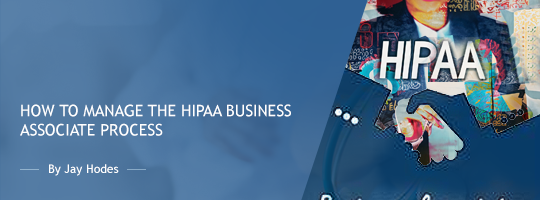- Email Us: info@webinarinstitute.com
Menu
How to Manage the HIPAA Business Associate Process + HIPAA Business Associate Compliance and Dangers – Recorded Webinar (Combo)
Recorded Webinar


If you are a healthcare organization that has vendors providing services as a HIPAA Business Associate, managing this process can be confusing. A “business associate” is a person or entity that performs certain functions or activities that involve the use or disclosure of protected health information on behalf of, or provides services to, a covered entity healthcare provider.
Having a systematic process to handle these business relationships to ensure a healthcare organization’s protected health information is being properly accessed and protected by the business associate is critical.
Organizations must know how to identify business associates. Business associate functions and activities include the use of tracking technologies, claims processing or administration; data analysis, processing or administration; utilization review; quality assurance; billing; benefit management; and practice management. Business associate services are legal; actuarial; accounting; consulting; data aggregation; management; administrative; accreditation; and financial.

This webinar is for HIPAA Covered Entities (CEs) and Business Associates (BAs). Criminals increasingly focus cyber-attacks on BAs because one hit can give them access to PHI of all the BA’s customers. Growth of serious BA PHI breaches affecting tens of millions of patients put the spotlight on BA HIPAA compliance, attracting HHS Office for Civil Rights investigations and aggressive private class action lawsuits filed within days of a breach targeting BAs and their CE customers. CEs that did nothing wrong can still be held liable to pay the same civil money penalty as their BA for the BA’s HIPAA violation under the Federal Common Law of Agency which is included in the HIPAA Enforcement Rule.
Simple steps, often overlooked but easy to follow, enable CEs and BAs to protect against costs and damage to their reputations caused by violations of HIPAA Rules that apply to BAs. The chain of HIPAA compliance starts with a CE. It extends to a BA that provides a CE with services involving PHI. And the chain of compliance continues on down to any subcontractors of a BA that perform services involving PHI. BA subcontractors are defined by HIPAA as BAs and are fully liable for compliance.
This webinar explains the interconnected HIPAA compliance responsibilities and liabilities of CEs and BAs. HIPAA Rules that apply to both are easy to follow, step-by-step, when you know the steps.
HIPAA Rules that apply to CEs in dealing with BAs and that BAs must follow are discussed and explained including:
CEs can find themselves fully liable for HIPAA violations committed by BAs and BAs for violations committed by Subcontractors under the little known Federal Common Law of Agency. However, risks associated with BA HIPAA compliance can be managed calmly and confidently by following the HIPAA Rules that are easy to follow, step-by-step.
CEs should attend to see what to look for in Due Diligence, how to obtain HIPAA required satisfactory assurances that a BA is complying with HIPAA and avoid liability by inadvertently making a BA their agent.
BAs should attend this webinar to see exactly what they must do to comply with HIPAA Rules – Security, Privacy and Breach Notification Rules. And what to look for in Due Diligence and how to obtain HIPAA required satisfactory assurances that a Subcontractor BA is complying with HIPAA while avoiding liability by inadvertently making a Subcontractor BA their agent
Covered Entities of all types who disclose PHI to BAs and allow BAs to create, receive, maintain and transmit PHI on their behalf
Business Associates of all types including for example:
Venue: Recorded Webinar